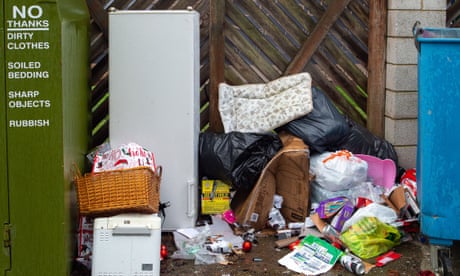- by foxnews
- 04 Mar 2025
‘We can’t police it’: Australian charities forced to spend millions to deal with donation dumping
‘We can’t police it’: Australian charities forced to spend millions to deal with donation dumping
- by theguardian
- 11 Jan 2023
- in news

Australian charities are forking out millions of dollars to deal with donation "dumping" amid increasing demands for their help as the cost-of-living crisis bites.
The St Vincent de Paul Society in South Australia knew that the Christmas break increased the risk of donated goods being left strewn across the ground outside bins, so it organised daily cleanouts of the bins - but it wasn't enough. Images show piles of goods stretching the length of its storefront in Mount Barker.
In the end, it had to hire trucks to remove the goods, some of which will end up in landfill.
The society's chief executive, Evelyn O'Loughlin, said people were donating "from the goodness of their hearts" but when donations piled up outside closed stores, they got damaged and became unusable.
"Some of it is useful," she said. "But there were also damaged goods, things we could never do anything with. Generally, the message is that people are very generous but if the shop is shut or the bin is full, keep it in your car for another day."
O'Loughlin said over the past few months Vinnies had seen a 25% surge in the number of people needing help to pay rent and bills, buy food and afford medication.
At the same time sorting through many unwanted donations and transporting them cost thousands, she said.
"We have to pay to get rid of them."
Charitable Recycling, a national network for charitable reuse and recycling, puts the national cost at about $18m a year for waste management and disposal.
O'Loughlin said Vinnies tried to "repurpose, reuse, recycle" everything, but it was not always possible. Only about 7,000 tonnes of textiles are recycled in Australia each year, and donating clothes to charity avoids them going to landfill - but not if they are stained, dirty or damaged.
The chief executive of Charitable Recycling, Omer Soker, said charity shops diverted more than 1m tonnes of household goods from landfill and were "very effective in turning donations into valuable resources".
Responsible donating meant if you wouldn't give it to a friend, don't give it to charity, Soker said.
Charity shops often experience a spike in dumping over the holiday period because people are off work and may be clearing out their homes.
"It was only in some shops," O'Loughlin said. "Even in some stores with cameras. We can't police it. Even when there's a sign saying please don't, people still do."
People should wait until the volunteers were back at work, and go into the store and meet them when they drop off their donations, she said.
"Illegal dumping" was also reportedly a concern at donation bins across Melbourne, at Salvos shops in Geelong, and Lifeline shops on the Gold Coast. O'Loughlin said it was a persistent national issue.
Charitable Recycling has found only 14% of donations is going to landfill, the same level as in 2016, which considering the "massive increase in consumer consumption" showed charities were "more effective and efficient at resource recovery than ever before".
The organisation is working with a consortium led by the Australian Fashion Council to launch a product stewardship scheme in March. The government-backed plan is for a "transition to a circular clothing economy" by improving clothing design, recovery, reuse and recycling.
A report from the consortium found Australia's 2,676 op shops allowed a "significant proportion" of secondhand clothing to be reused, handling and sorting more than 720m items annually.
Charitable Recycling's statistics show that Australians donate more than 1m tonnes of clothing and goods each year. The organisation urges people to consider the quality of the donation to avoid damaged or unusable goods becoming a burden for the recipients.
The organisation's advice also includes checking with shops to ensure they accept what you're donating, not leaving items outside the bin or shop, and making sure all items are clean, undamaged and appropriately packaged.
- by foxnews
- descember 09, 2016
Bus travel sees 'steady growth' as flyers seek alternative transportation
People who ride on airplanes might rely on alternative transportation for a number of reasons. A CEO of a bus travel company shares insights with Fox News Digital.
read more


